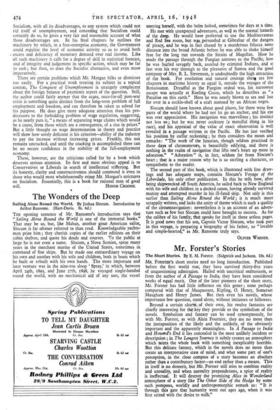The Wonders of the Deep
THE opening sentence of Mr. Ransome's introduction says that "Sailing Alone Round the World is one of the immortal books." That may be so, but, like Mahan, another great American sailor, Slocum is far oftener referred to than read. Knowledgeable yachts- men prize him ; they cherish copies of the earlier editions on their cabin shelves, and quote his deeds and courses. To the public at large he is not even a name. Slocum, a Nova Scotian, spent many years in the merchant marine of the United States, sometimes in command of fine ships. But he made one extraordinary voyage on his own and another with his wife and children, both in boats which he built or rebuilt with his own hands. The more important and later venture was in the nine-ton sloop Spray,' in which, between April 24th, 1895, and June 27th; 1898, he voyaged single-handed round the world, with no mechanical aid of any sort, the vessel
steering herself, with the helm lashed, sometimes for days at a time.
He met with unexpected adventures, as well as the normal hazards of the deep. He would have preferred to use the Mediterranean and Red Sea route, but weskpersuaded at Gibraltar of the dangers of piracy, and he was in fact chased by a murderous felucca some distance into the broad Atlantic before he was able to shake himself free for the long run towards the Straits of Magellan. How he made the passage through the Fuegian narrows to the Pacific, how he was hurled savagely back, assailed-by criminal Indians, and at last won his way through to the pleasures of Samoa and the good company of Mrs. R. L. Stevenson, is undoubtedly the high attraction of the book. For resolution and natural courage there are few chapters in maritime history to equal it, outside the voyages of the Renaissance. Dreadful as the Fuegian ordeal was, his narrowest escape was actually at Keeling Cocos, which he describes as "a Paradise on this earth." Here he was nearly blown to sea and lost for ever in a cockle-shell of a craft manned by an African negro.
Slocum should have known about good places, for there were few parts of the world where he had not let go an anchor, and his eye was ever appreciative. His navigation was marvellous; his instinct not less so but he was never cocksure (a merciful thing in his race), and his appraisal of the value of exact observation is well revealed in a passage written in the Pacific. He has just verified his position by stellar reckoning ; he then considers the moon and remarks : " The work 'Of the lunarian though seldom practised in these days of chronometers, is beautifully edifying, and there is nothing in the realm of navigation that lifts one's heart up more in adoration." " Adoration " is, in fact, seldom far from Slocum's heart ; that is a major reason why he is so sterling a character, so sympathetic to the reader.
The second part of this book, which is illustrated with line draw- ings and has adequate maps, contains Slocum's Voyage of the Liberdade, his only other publication. In this he tells how, after being shipwrecked off South America, he sailed back to New England with his wife and childrefi in a decked canoe, having already survived mutiny and attempted murder in his ill-fated ship. Not only is this earlier than Sailing Alone Round the World ; it is much more scrappily written, and lacks the unity of theme which is such a quality of the circumnavigation: nevertheless it is an account of an adven- ture such as few but Slocum could have brought to success. As for the calibre of his family; that speaks for itself in these artless pages. It is good news that his son, Captain Victor Slocum, who took part in this voyage, is preparing a biography of his father, so " lovable and simple-hearted," as Mr. Ransome truly says.
OLIVER WARNER.






























 Previous page
Previous page